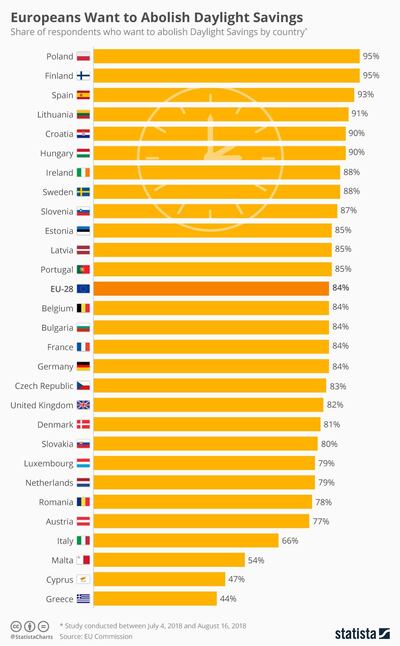Next October may be the last time European citizens will have to adjust their clocks, as the European Union prepares to end the controversial practice of daylight saving.
The European Commission said on Friday it would decide on whether to do away with the practice, which is much loathed by its citizens and is seen as responsible for long-term health problems.
The majority of respondents to an online public survey conducted by the EU commission expressed their disagreement with the system that Brussels has been enforcing since the the 1980s.
Eighty-four per cent of the five million surveyed European citizens expressed their will to remain on the same time zone all-year-round, with peaks in Finland (95 per cent), Poland (95 per cent) and Spain (93 per cent). Only a small majority in Greece and Cyprus (56 and 53 per cent) voted in favour of the current system.
Critics of the twice-yearly clock changes say it can cause long-term health problems, as well as disruptions to their biorhythm that include difficulty sleeping, irritation and lack of concentration.
A 2018 US study found that switching over the daylight saving, and losing an hours sleep, raised the risk of a heart attack the following Monday by five per cent.
Anecdotal evidence mentioned in the European Commission’s proposal also points to a possible link between summertime arrangements and road traffic accidents.
Energy savings – which are the main drivers of the current arrangements – have proven to be marginal, the European Commission found.
Political considerations are also at play in the decision. In Spain, issues of clocks and hours have long been a grim throwback to a time of war and repression. In 1942, Spain's dictator, General Francisco Franco, changed the country's time zone to coincide with Germany's in an act of solidarity with his fascist ally that has never been undone. During the Second World War, the practice of changing clocks initiated by Germany in 1916 spread to many European countries.
This means that while Spaniards have spent the past decades consuming meals at the same time as the rest of Europeans – 1 pm and 8 pm, according to the position of the sun – their clocks are set on 2pm and 9pm.
The Association for the Renationalisation of Spanish Working Hours, led by Ignacio Buqueras, has been campaigning for over 10 years to push for this change, arguing that Spain's productivity would increase and civil society improve if this historical anomaly was to come to an end. The organisation pointed out that studies have found Spaniards to sleep an hour less than the rest of Europe, which means more accidents at work and less efficiency.
_______________________
Read more:
Brexit no-deal may stop Eurostar trains entering France says French minister
German spy chief faces calls to resign over far-right links
_______________________
But according to Spanish newspaper El Pais, the issue in Spain remains controversial. “The measure divides the country geographically,” an article on the EU proposal published on September 12 read. “Galicia applauds it, but raises opposition in areas such as the Balearic Islands and Valencia due to its alleged negative impact leisure and tourism, as it would get dark earlier.”
Alongside Spain, Switzerland – which is not a EU or a EEA country but is part of the single market – may also find itself grappling with a historical conundrum. Its parliament approved the law on daylight saving time in 1977, but it was successfully challenged by a group of farmers and in a subsequent nationwide vote in 1978. Government and parliament, however, introduced a new bill on the issue in 1980, against the will of the people.
Farm workers were concerned an extra hour of summer daylight would increase their work time., while parents were concerned that Swiss school children – who start early by European standards – would be negatively impacted by having to wake up an hour earlier in the summer.
Local media defined this as the Swiss century-old daylight saving time fight, which might be put to rest if Switzerland – as it did back in the '80s – aligns with surrounding European countries.
While the move may heal the rift between the Brussels and its citizens and solve long-standing disputes in some countries, it carries the potential to divide EU bloc further.
The Republic of Ireland, for one, could potentially run on a different time to Northern Ireland, as the UK could continue to operate summer and winter clocks.
The EU will give countries the option of deciding on a preferred time by April 1, 2019, and adopt permanent summer or winter time.
Outside the EU, a handful of European countries have already stopped switching between summer and winter time, including Russia, Turkey, Belarus and Iceland.


